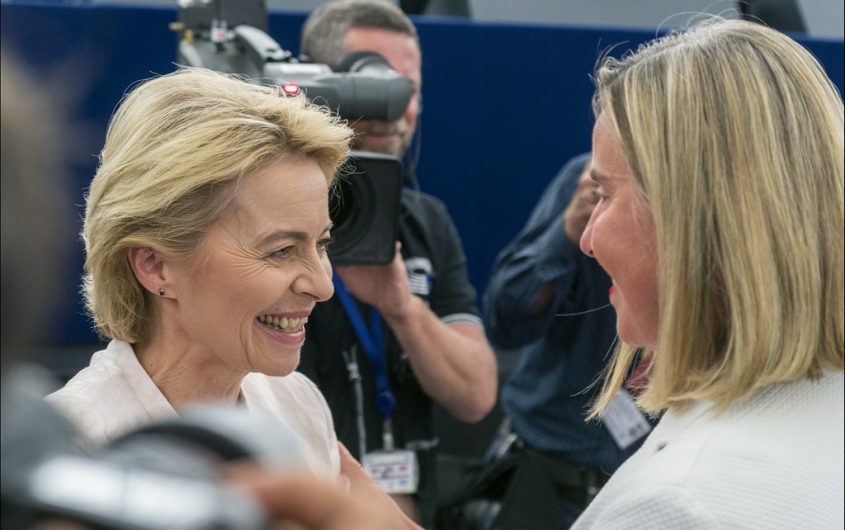
European Parliament via Flickr
Germany on International Women’s Day 2020

Louise K. Davidson-Schmich
University of Miami
Louise K. Davidson-Schmich is Professor of Political Science at the University of Miami. Davidson-Schmich came to UM in 2000 after receiving her PhD and MA in political science from Duke University and completing her undergraduate degree in international relations at Brown University. In 2016 she was a New Zealand Fulbright US Scholar at the Victoria University of Wellington.
Her research interests include gender and politics as well as politics in long-term democracies. She is the author of Gender Quotas and Democratic Participation: Recruiting Candidates for Elective Office in Germany (University of Michigan, 2016) as well as Becoming Party Politicians: Eastern German State Legislators in the Decade Following Unification (University of Notre Dame Press, 2006). Davidson-Schmich is also the editor of Gender, Intersections, and Institutions: Intersectional Groups Building Alliances and Gaining Voice in Germany (University of Michigan, 2017) and of a 2011 special issue of the journal German Politics entitled “Gender, Intersectionality, and the Executive Branch: The Case of Angela Merkel.” Davidson-Schmich is a member of the executive committee of the International Association for the Study of German Politics and serves on the editorial boards of Women, Politics and Policy, German Politics, German Politics and Society, and the German Studies Association’s Spektrum book series. She has published in journals including Party Politics, The Journal of Legislative Studies, and Democratization and been awarded funding from the Alexander von Humboldt Foundation, Fulbright, and the National Science Foundation’s Advance program (called SEEDS at the University of Miami).
With the departure of Elizabeth Warren from the U.S. presidential race, the “highest glass ceiling” in this country remains unbroken. Germany, however, has had a female chief executive since 2005. German children turning 15 and younger this year will have only ever known a Bundeskanzlerin. Some evidence exists that female leadership makes a difference for what political scientists call the substantive representation of women, or policy decisions responding to the needs of women and girls. What is the case fifteen years after Merkel assumed office in Germany? Has her administration improved women’s status?
One way to assess this is to use the United Nation’s Gender Related Development Index. This metric compares men’s to women’s life opportunities in countries across the world in order to assess where citizens of both sexes have the most equal opportunities. In 2005 when Merkel came into office the Federal Republic already ranked quite high in international comparison, with Germany ranked the 20th most gender-equal country in the world. (Norway ranked first.) After over a decade with a woman at the helm, Germany moved up to fourth place globally in 2019.
The UN also releases a Gender Inequality Index designed to measure women’s status in three dimensions: reproductive health, empowerment, and the labor market. Germany ranks fourth in the world today here, too; in 2005, when Merkel entered the Chancellery, the country ranked ninth in what was then known as the Gender Empowerment Measure. The UN’s data show that in comparison to 2005, when women only earned 53.9 percent of what men earned, women in Germany in 2019 now earn 69.1 percent of men’s income. Women’s time use ratio of performing uncompensated care work compared to men’s rate fell from 1.8 in 2005 to 1.6 today.
Policies passed by the Merkel government—usually in conjunction with its Social Democratic coalition partner—have likely contributed to these improvements to gender equality. Over the course of the past four electoral periods several notable pieces of legislation have improved German women’s ability to participate in paid work while also enabling men to play a greater role in care responsibilities.
In between 2005 and 2009, the first CDU/CSU/SPD government began an expansion of childcare for children aged 12 to 35 months through the Kinderförderungsgesetz, promising €4 billion to establish childcare centers across the country for children ages 14 months to three years. The goal was to legally guarantee a spot for every child in that age group by the year 2013. Another component of these reforms was the creation of Parents’ Payments (Elterngeld) for new mothers. Twelve months of employment leave would now be compensated at 67 percent of a mother’s previous salary (subject to upper limits on income); women who had no (or low) earnings prior to pregnancy were granted €300 per month for a year after the birth of a child. Alternatively, women could choose instead to take three years unpaid leave. If women elected to take the twelve months’ paid leave, their partners became eligible for what came to be known as two “Daddy Months.” Finally, these packages of reforms allowed parents to take tax credits for any privately contracted childcare expenses, for example the costs of a nanny (Wahl 2008).
In 2015, the second Grand Coalition government expanded the Parents’ Payment into a new program called Parents’ Payment Plus (Federal Ministry 2015). This policy now allows paid parental leave for both mothers and fathers, who are now eligible for 67 percent salary replacement. The leave can be divided as the new parents see fit, including taking joint leave. Moreover, if one or both partners decides to work part time, the total length of the leave is extended.
These policies have had a positive effect on Germany’s birthrate, which, in 2016, rose to its highest level since 1973 (Deutsche Welle 2018). The federal government reported that approximately one-third of new fathers availed themselves of the Parents’ Payment in 2016 (Federal Ministry 2016). In 2019 the government also permitted “Brückenteilzeit” or “Bridge Part Time Work”—allowing an employee to temporarily move between working full time, to working part time for a period of one to five years, and then be guaranteed a return to a full time position again. Such extended part time work would allow both male and female workers to reduce their hours during a time when children or elderly parents require intensive care without sacrificing their position in the long term.
Also during the first Grand Coalition, a 2006 Equal Treatment Act (Allgemeine Gleichbehandlungsgesetz, AGG) was passed, formally banning gender discrimination in the workplace, as well as discrimination on the basis of ethnicity, race, religion, sexual identity, or disability.[1]
To promote women’s positions of economic leadership, a 2015 law was passed, requiring a 30 percent women’s quota for all publicly-listed companies with employee representation on their boards; if firms fail to comply with the quota, open board seats will remain empty. The law also mandated a 30 percent quota for boards of (partially) state-owned entities starting in 2016, to be increased to 50 percent by 2018. Publicly-listed companies or those that have employee representation on their boards were obliged to set their own gender targets, but the self-determined quotas needed to be fulfilled by 2017. Finally, the federal civil service was required to set its own transparent targets for women in leadership posts. By 2018 this law had effectively raised the proportion of women on corporate boards. However, women’s numbers stagnated in upper management positions, leading for calls to extend quotas further down into the firm structure in the future (Holst and Wrolich 2018).
In conjunction with the SPD, the CDU/CSU also addressed the concerns of women workers at the lower end of the economic spectrum. In 2015, the Federal Republic adopted for the first time a national minimum wage law; although not framed in gendered terms, this legislation primarily affected women as two-thirds of low-wage workers in Germany are female (Henninger, 2017, 173-4).
Most recently, the 2017 Wage Transparency Act (Entgelttransparenzgesetz) entitles employees of companies with more than 200 staff to know what their peers in similar positions are earning. It also requires larger private companies, with more than 500 employees, to regularly review their pay structures and to publish—as part of their financial reports—details on their equality and equal pay policy and what action they are taking.
All of these laws, passed under Germany’s first female chancellor, have improved women’s status in the workplace and allowed men to be more present in the home. With German women earning less than 70 percent of what German men do, however, there is much room for improvement and many of the laws have been criticized by feminists for not going far enough, not being rigorously enforced, and not having steep enough penalties for non-compliance. As Merkel’s term comes to an end, and with Annegret Kramp-Karrenbauer’s stepping down from party leadership, a female successor to Merkel in the CDU/CSU seems unlikely. Moreover, the rise in popularity of the Alternative for Germany, which campaigned on an “anti-gender ideology” platform calling for traditional gender roles, is pressuring the CDU/CSU way from the progressive moves it made under its first Bundeskanzlerin. What the post-Merkel era will bring for gender equality in Germany remains to be seen.
[1] Nonetheless, some subsequent legal developments have limited Muslim women’s access to the workforce. In 2017, the federal government banned public sector employees from wearing full-face coverings such as the burqa and niqab while carrying out their duties; many German Länder now forbid school teachers from wearing hijab head coverings in certain circumstances. Conversely, other legislation has tried to improve migrant women’s employability by promoting language acquisition (Donovan 2017).
Deutsche Welle (2018), ‘Are family policy reforms to thank for Germany’s rising birth rates?’ 29. March. Available here: https://www.dw.com/en/are-family-policy-reforms-to-thank-for-germanys-rising-birth-rates/a-43188961 . Accessed 16 September 2018.
Donovan, Barbara (2017), ‘Migrant Women and immigrant integration Policy‘ in Louise K. Davidson-Schmich, (ed) Gender, Institutions, and Intersections: Intersectional Groups Building Alliances and Gaining Voice in Germany (Ann Arbor, MI: University of Michigan Press), pp. 107-144.
Federal Ministry for Family Affairs, Senior Citizens, Women and Youth (2015), ‘Elterngeld Plus: The New Generation of Compatibility”, Available at https://www.bmfsfj.de/blob/93632/05485225123c3b6093ffaf3d36bb5568/elterngeldplus-mit-partnerschaftsbonus-englisch-data.pdf. Accessed 16 September 2018.
Federal Ministry for Family Affairs, Senior Citizens, Women and Youth (2016), ‘Vaterreport 2016.’ Available at https://www.bmfsfj.de/blob/112720/2d7af062c2bc70c8166f5bca1b2a331e/vaeterreport-2016-data.pdf Accessed 17 September 2018.
Holst, Elke and Katharina Wrolich (2018), ʽTop-decision making bodies of large businesses: Gender quota for supervisory boards is effective – development is almost at a standstill for executive boards‘, DIW Weekly Report. 8 (No. 3), pp. 17-31.
Wahl, Angelika von (2008) ‘From Family to Reconciliation Policy: How the Grand Coalition Reforms the German Welfare State’, German Politics and Society 26 (No. 3), pp. 25 – 49.








